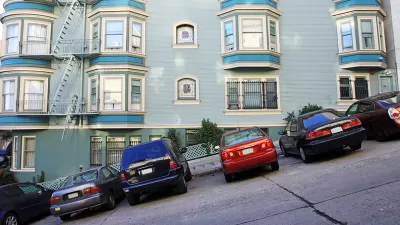The infamous MonkeyParking app that last year ran afoul of public sentiment and the law is back with a new business model that offers residents the chance to auction that most precious of commodities—urban parking space.
"This month, MonkeyParking quietly returned to San Francisco in a below-the-radar beta mode," reports Joe Eskenazi. The re-appearance of the app includes an all new business model. According to Eskenazi, "[in] its new model, rather than enable users to peddle public property—which is both illegal and morally dodgy—MonkeyParking is now focused on private property: driveways, to be specific. If you pull out of and pull into your driveway for five minutes a day, [MonkeyParking CEO Paolo] Dobrowolny says, then a valuable resource is lying fallow for 23 hours and 55 minutes a day."
Eskenazi cites a deputy San Francisco city attorney to note that the new business model is, in fact, legal, unlike its predecessor, which would have auctioned off public parking spaces.
The opportunity for the 100 test users enlisted by MonkeyParking to test the new model in San Francisco is actually the space on the street in front of the driveway, where property owners are allowed to park or grant others permission to park, because most driveways in the city are not large enough to fit a car without blocking the sidewalk.
FULL STORY: MonkeyParking Is Back and Ready to Disrupt Your Driveway

Maui's Vacation Rental Debate Turns Ugly
Verbal attacks, misinformation campaigns and fistfights plague a high-stakes debate to convert thousands of vacation rentals into long-term housing.

Planetizen Federal Action Tracker
A weekly monitor of how Trump’s orders and actions are impacting planners and planning in America.

San Francisco Suspends Traffic Calming Amidst Record Deaths
Citing “a challenging fiscal landscape,” the city will cease the program on the heels of 42 traffic deaths, including 24 pedestrians.

Defunct Pittsburgh Power Plant to Become Residential Tower
A decommissioned steam heat plant will be redeveloped into almost 100 affordable housing units.

Trump Prompts Restructuring of Transportation Research Board in “Unprecedented Overreach”
The TRB has eliminated more than half of its committees including those focused on climate, equity, and cities.

Amtrak Rolls Out New Orleans to Alabama “Mardi Gras” Train
The new service will operate morning and evening departures between Mobile and New Orleans.
Urban Design for Planners 1: Software Tools
This six-course series explores essential urban design concepts using open source software and equips planners with the tools they need to participate fully in the urban design process.
Planning for Universal Design
Learn the tools for implementing Universal Design in planning regulations.
Heyer Gruel & Associates PA
JM Goldson LLC
Custer County Colorado
City of Camden Redevelopment Agency
City of Astoria
Transportation Research & Education Center (TREC) at Portland State University
Jefferson Parish Government
Camden Redevelopment Agency
City of Claremont



























